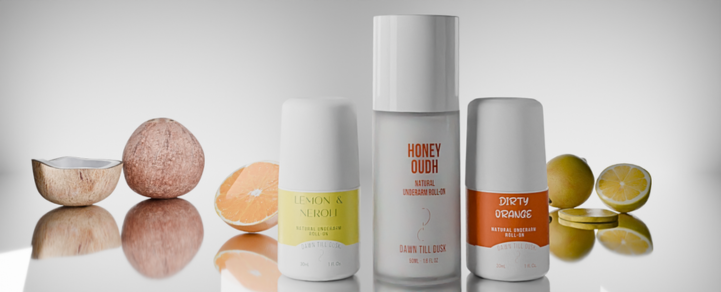Natural vs Synthetic Roll On Deodorant

The Great Debate: Natural vs Synthetic Roll-On Deodorants, Which is Right for You?
When it comes to personal hygiene, deodorant is an essential item for most people. It helps to control body odor and keeps us feeling fresh and clean. However, with so many different types of deodorants available on the market, it can be overwhelming to decide which one is right for you. In this article, we will be diving deep into the world of deodorants and exploring the pros and cons of natural and synthetic roll-on deodorants. We'll also uncover some surprising facts about these personal care products that may leave you questioning which type of deodorant is truly best for you.
Natural Roll-On Deodorants: The Good, The Bad and The Ugly
Natural roll-on deodorants are made with ingredients that are derived from natural sources such as plants, minerals and other natural compounds. These deodorants often contain baking soda, cornstarch, coconut oil and other natural ingredients that work together to neutralize odor-causing bacteria and provide a pleasant scent.
One of the biggest benefits of natural roll-on deodorants is that they are free from harsh chemicals and synthetic fragrances. This means that they are less likely to cause skin irritation or allergic reactions, making them a great choice for people with sensitive skin. Additionally, natural roll-on deodorants often contain moisturizing ingredients, which can help keep your underarms feeling soft and smooth.
But, are natural deodorants really all they're cracked up to be? Unfortunately, the answer is not that simple. One of the downsides of natural roll-on deodorants is that they may not be as effective at controlling odor as synthetic deodorants. This is because natural deodorants often lack the antiperspirant ingredients that are found in synthetic deodorants, which help reduce sweating. Additionally, natural deodorants may not have as long-lasting of a scent as synthetic deodorants, which could be an issue for some people.
Another point to consider is the fact that many natural roll-on deodorants use essential oils as a fragrance, which can be problematic for those with sensitive skin. Essential oils can cause irritation and allergic reactions, and are not recommended for use on broken or irritated skin. Moreover, some natural deodorants can be expensive than synthetic ones, which can be an issue for people with a tight budget.
Synthetic Roll-On Deodorants: The Good, The Bad and The Ugly
Synthetic roll-on deodorants are made with a combination of synthetic ingredients such as aluminum and parabens. These ingredients work together to control both odor and sweating, making them a popular choice for people who want a more effective deodorant.
One of the biggest benefits of synthetic roll-on deodorants is that they are highly effective at controlling odor and sweating. This is because they contain antiperspirant ingredients that help to reduce sweating and fragrances that mask odor. Additionally, synthetic deodorants often have a long-lasting scent, which can help to keep you feeling fresh throughout the day.
However, synthetic roll-on deodorants have their own set of problems. One of the downsides of synthetic roll-on deodorants is that they may contain harsh chemicals that can cause skin irritation or allergic reactions. Additionally, synthetic deodorants are not biodegradable, which means that they can have a negative impact on the environment.
But, that's not all. Studies have linked the use of aluminum-based antiperspirants to an increased risk of breast cancer and Alzheimer's disease. While more research is needed to fully understand the potential risks, it is something to consider when choosing a synthetic roll-on deodorant.
Another issue with synthetic deodorants is that they can cause staining on clothes. This can be a nuisance, especially if you have a lot of white shirts or delicate fabrics that are easily stained.
So, which type of deodorant is right for you? The answer to this question ultimately depends on your personal preferences and concerns. If you have sensitive skin, a natural roll-on deodorant may be a better choice for you. Additionally, if you are concerned about the environmental impact of your personal care products, a natural deodorant may be a better choice.
On the other hand, if you are looking for a deodorant that is highly effective at controlling odor and sweating, a synthetic roll-on deodorant may be a better choice for you. Additionally, if you prefer a deodorant with a long-lasting scent, a synthetic deodorant may be a better choice.
It's worth noting that some people opt for a combination of both, using a natural deodorant during the day and a synthetic one for special events or for added protection during heavy sweating.
Ultimately, the choice between a natural roll-on deodorant and a synthetic roll-on deodorant is a personal one. It's important to weigh the pros and cons of each type and consider your own unique needs and preferences. With this information in mind, you'll be able to make an informed decision and find a deodorant that works best for you.

